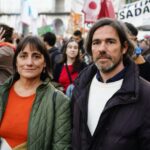
The European Union and Mercosur, a group of five South American countries, are determined to conclude negotiations on a long-awaited trade deal by the end of the year after making progress on resolving outstanding issues. Officials on both sides told the Financial Times of renewed momentum to finalize the agreement, which has been under discussion for two decades, despite objections from France.
“It is a geopolitical and economic necessity,” said an EU diplomat. Mercosur, which includes Brazil, Argentina, Uruguay, Paraguay and Bolivia, is an attractive market for EU exporters.
The deal would create a market of 780 million people and save European companies more than €4 billion a year in tariffs, according to data from the European Commission. EU companies have €330 billion in investments in the five South American countries.
Negotiations have been hampered since French President Emmanuel Macron opposed the deal in January, citing environmental damage and unfair competition for farmers. However, France’s opposition has received support only from Austria, insufficient to block a deal that needs approval from a majority of the 27 EU members.
EU officials say they are prepared to face French opposition, noting that the deal includes a commitment to the Paris Agreement, which aims to keep global warming below 1.5 degrees Celsius. Germany, Spain and other member states have been pushing for the deal, initially agreed in 2019 but stalled since then, to be finalized. Supporters believe it will boost the economy and strengthen trade ties amid rising global tensions.
Ursula von der Leyen, re-elected for a second term as president of the European Commission, has pledged to finalize the deal. She is due to travel to Rio de Janeiro in November for the G20 summit, where she will be able to resolve outstanding issues with President Luiz Inácio Lula da Silva.
Mercosur countries have expressed concern that environmental issues raised by the EU mask protectionist tendencies. Brasilia criticized a letter from Brussels that sought to add binding commitments on climate and deforestation. Other concerns include a new EU anti-deforestation law that would ban imports of goods produced on deforested land, such as timber and beef. Mercosur wants assurances that the legislation will not eliminate the benefits of the agreement for its exporters.
Another contentious issue is EU pressure for Argentina to limit the use of protected food names, such as Parmesan cheese, due to the country’s long tradition of production by the Italian community. Brazil is also seeking measures to protect its automotive industry.
In Europe, the deal faces resistance from farmers who have protested against rising costs, falling profits and new environmental regulations. They argue that cheaper South American produce is produced to lower standards than in the EU.
“We have some remaining issues that are important. It’s not easy, but we’ve made a lot of progress,” said another diplomat involved in the negotiations.
Paraguayan President Santiago Peña told the Financial Times that European countries were not enthusiastic about the deal, but acknowledged that von der Leyen and Macron were busy with recent elections. Argentine President Javier Milei, who was initially critical of Mercosur, and his foreign minister, Diana Mondino, have expressed support for the deal.
The European Commission said negotiating teams from both sides continue to work at a technical level to advance outstanding issues, focusing on ensuring the deal meets EU sustainability goals and respects European agricultural sensitivities.
Source: https://www.ocafezinho.com/2024/08/06/uniao-europeia-se-aproxima-de-acordo-comercial-com-mercosul/

